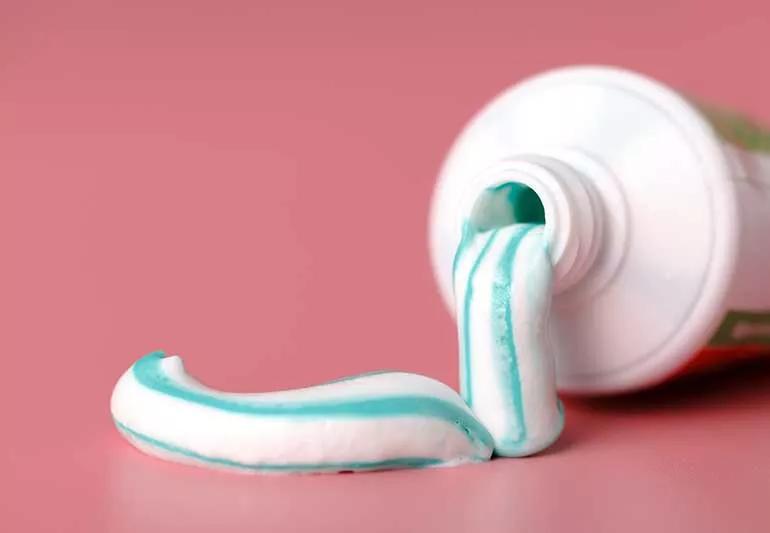It can actually make your blemish worse, not better

Image content: This image is available to view online.
View image online (https://assets.clevelandclinic.org/transform/804419b2-58e7-4289-af25-402b2cd7d771/Toothpaste-On-Acne-995695892-770x533-1_jpg)
Squeezed toothpaste from tube.
If you’ve ever needed to get rid of a pimple in a pinch (and who among us hasn’t?), you may have thought back to the advice you heard back in high school. Some well-meaning friend told you, “Just dab some toothpaste on it and it’ll dry out overnight!” — and it’s stuck with you ever since.
Advertisement
Cleveland Clinic is a non-profit academic medical center. Advertising on our site helps support our mission. We do not endorse non-Cleveland Clinic products or services. Policy
But is it true? Does it work? Dermatology resident Taylor Bullock, MD, explains why you should skip the toothpaste trick and what to put on your pimples instead.
Toothpaste is made for your mouth, and in your mouth is where it should stay. When it comes to your skin, stick with tried-and-true spot treatments that are specially formulated to target occasional acne.
“The toothpaste advice sounds like an easy, quick solution using something already available around the house,” Dr. Bullock says, “but it’s not a good idea.”
Toothpaste used to be made with an ingredient called triclosan, a compound that was also thought to help acne by killing off bacteria. But triclosan’s effectiveness has long been debated, and in 2017, the U.S. Food and Drug Administration (FDA) issued a rule to significantly limit its use. As of 2019, no toothpaste brands sold in the U.S. use triclosan.
With the original reasoning behind the toothpaste-as-spot-treatment guidance now outdated, it’s time to put the myth to rest!
“Toothpaste will likely do more harm than good for your skin,” Dr. Bullock states, “so, what happens is that you end up with a redder, more irritated pimple than you started with.”
That’s because your toothpaste is full of ingredients formulated to help your teeth by reducing tartar and strengthening enamel. But those same ingredients can be too strong or harsh for your skin, leading to:
Advertisement
Basically, all of the things you don’t want to deal with, especially when your goal is to zap an already-obvious zit.
Better pimple treatment options
When you feel a pimple coming on but don’t have a ton of money to drop on fancy products, what can you do? The good news is that plenty of spot treatments (the kind that are actually designed to go on your skin) don’t cost much more than a tube of toothpaste, and you can buy them at the drugstore.
“They’re easy to come by, they’re cheap and they’re much better, more effective spot treatments for a pimple,” Dr. Bullock notes. Look for products with these ingredients:
Spot treatments that contain these ingredients are designed to be dabbed onto existing pimples. Both salicylic acid and benzoyl peroxide are also common ingredients in face washes that aim to prevent acne in the first place.
So, leave the toothpaste to your teeth and give your blemishes the TLC they need. Your skin will thank you.
To learn from a dermatologist on related topics, listen to the Health Essentials Podcast episode, “Skin Care Tips, Tricks and Trends.” New episodes of the Health Essentials Podcast publish every Wednesday.
Advertisement

Sign up for our Health Essentials emails for expert guidance on nutrition, fitness, sleep, skin care and more.
Learn more about our editorial process.
Advertisement
It’s best to avoid picking at zits, which can damage your skin (though there are ways to minimize the risk)
This medication only works well for short periods of time and when paired with other treatments
‘Zit stickers’ can help heal a new or popped pimple, but they’re limited when it comes to managing acne
Try exfoliating and using salicylic acid to treat this pesky skin care issue
Wear light, breathable clothing, shower after you exercise and change your sheets regularly
As you age, hormones can continue to play a big role in breakouts
Some remedies might help banish breakouts, but others are best avoided
Birth control pills with estrogen are best for fighting hormonal acne
Although it could be used as a moisturizer, this new trend is not recommended
Communicating clear limits helps protect your time, energy and emotional well-being
High cholesterol can be genetic, but testing and treatment can lower your heart disease risk